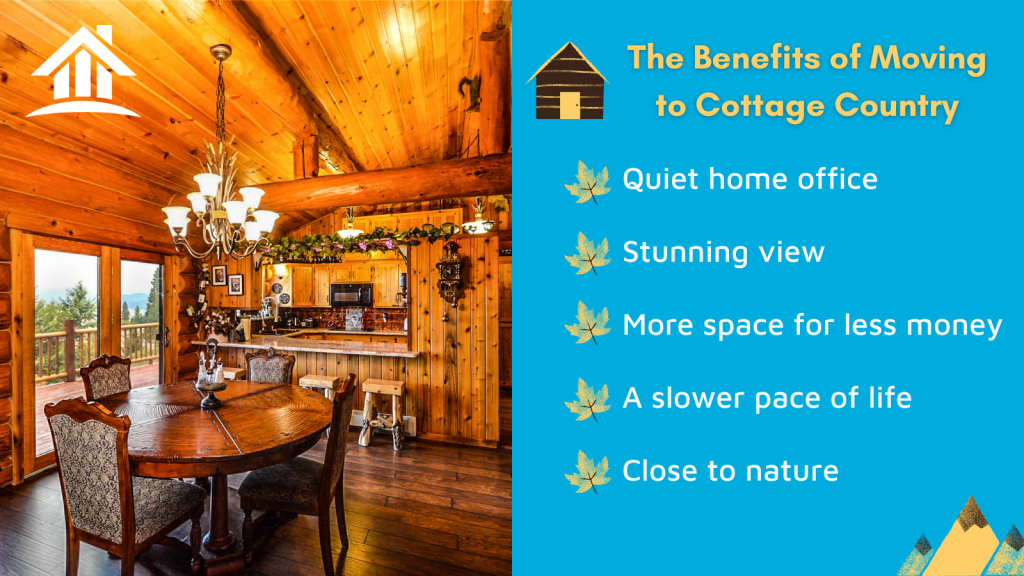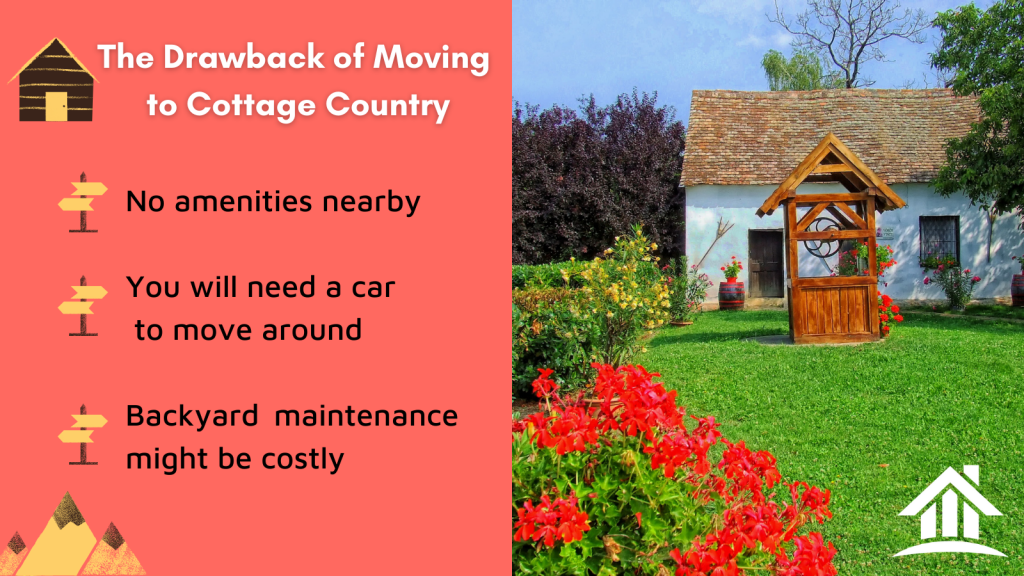The pandemic has pushed Canadians out of big cities like Vancouver and Toronto and increasingly into the suburbs. But many are taking it a step further and moving to cottage country.
More Canadians no longer see cottages as a weekend getaway but as a full-time lifestyle. As a result, the price of single-family homes in some cottage country areas rose 11.5% in the first nine months of 2020. In these areas, realtors also reported they’ve noticed a significant increase in interest from the remote workforce who want to relocate to cottage areas as their primary residence.
If you’re considering moving out of the city to an area with more affordable housing and a slower pace of life, then cottage country maybe your next full-time residence. But moving so far from the city isn’t all benefits. This article reviews the pros and cons of moving to a cottage country.

Moving to cottage country is now possible with remote work
The pandemic has shifted how we go about our daily work. Instead of sticking it to an office 9 to 5, we’re able to work anywhere with an internet connection. Although many businesses will revert to the office after the pandemic, remote work will continue for others. This pivot to remote work lets Canadians move to cottage country areas such as Muskoka in Ontario, the Sunshine Coast in British Columbia, or Eastern Townships in Quebec while retaining their city job.
There’s also a strong chance that once companies ask their employees to move back to the office, policies will open up to work-from-home days. Travelling from cottage country to the city five days a week may be too much of a hassle to justify moving to Muskoka or Sunshine Coast. But if down the road, you could work from home three days a week and only travel to the city the other two days, it may turn a full-time cottage life into more of a possibility.
You can find a home with more space at a lower cost
When you buy a home in a city, most of the hefty price tag isn’t for the building but the land underneath. High demand, strict building regulations, and dense populations make residential land in populous cities insanely expensive. That’s why Toronto and Vancouver’s properties often provide little square footage for a $1 million+ listing price.
Cottage areas have less demand, more land available, and a relatively sparse population. When you purchase a cottage property, your money goes further because the land is less expensive. These, overall, make cottage properties more affordable. It could even be a terrific option as a first home.
The opportunity to purchase more space for less capital can make it easier to raise or take care of your children, create a home office, or start hobbies that you couldn’t have in an 800-square foot city condo apartment.
The premium you pay for land in larger cities is because you’re in proximity to office spaces, entertainment, and other amenities. But, if you’re able to work remotely, there’s little point in swallowing such a premium price when you’re not even going to an office. Cottage countries can offer entertainment and amenities not available in the city, such as hiking trails, lakes, and better air quality.
Cottage country provides a slower pace of life that’s closer to nature
City life moves quickly. You may move from work to the gym, to dinner with friends. As much fun as this sounds, it gets exhausting. Sometimes, the lack of restaurants and bars and other entertainment amenities in cottage areas is a benefit. Cottage country ultimately provides a slower pace of life.

Say goodbye to big-city amenities when moving to cottage country
As you move further away from the city, many of the big city amenities you may be used to disappear. Cities can provide certain businesses or services due to the dense population, which creates enough demand for certain things to keep said services around. There may be gluten-free bakeries and organic grocery stores on every corner in downtown Toronto and Vancouver. But it’s less likely you’ll find these in Muskoka.
From food delivery to online shopping, delivery services may experience longer-than-normal delivery times in more rural areas. You may also find more expensive delivery fees to get your packages, especially for large items like furniture and appliances, because cottage locations are relatively remote.
A car is the only way to move around cottage country
Due to relatively sparse populations, cottage countries lack the same public transportation systems as major cities. There’s no Skytrain or TTC subway in these areas. A personal car is mandatory if you want to get around. Even ridesharing apps likely won’t have the same availability as what you’re used to.
Further, because the land is so abundant in cottage areas, there’s also no reason to pack services together closely. You may find a dry cleaner, grocery store, bakery, and lunch spot all in one block in major cities, but each one can easily be a five-minute drive from the other in cottage country.
More green space comes with a price
Cottage country might be the opportunity to get a big backyard for your kids and pets. But remember that a large backyard means more lawn maintenance. The number of businesses available in cottage areas to help you maintain this space may also be limited.
Additionally, the abundance of green space can also mean more animals — not all of which are friendly. Some cottage areas feature coyotes, bears, and many unwanted pests. This can be especially dangerous if you have dogs that enjoy wandering in the backyard.
There are many pros and cons to moving to a cottage country. The world’s pivot to remote work now makes shifting to a cottage property full-time while retaining a big city salary a possibility. Further, these areas can provide more affordable housing with a slower pace of life closer to nature. However, the drawbacks include losing favourite amenities, gaining a need to drive everywhere, and the additional responsibilities that come with more green space. Cottage country is a terrific opportunity, but ultimately it isn’t for everyone.

